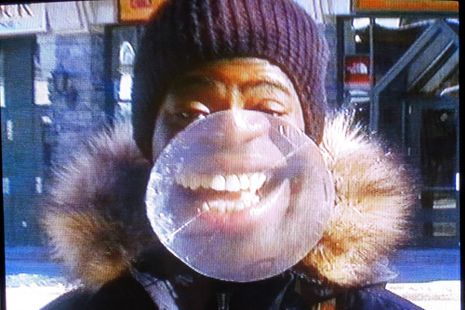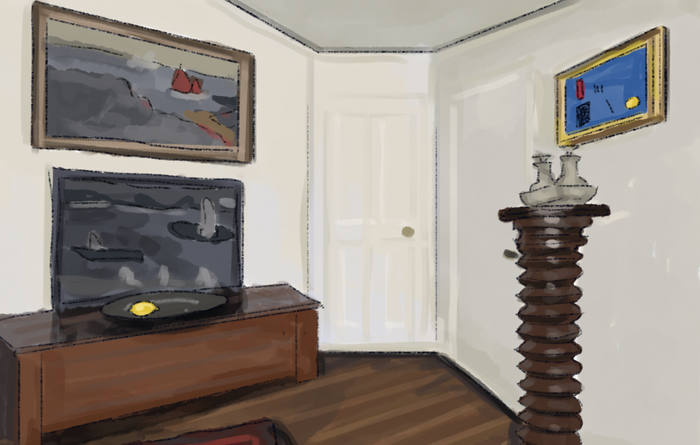Kettle’s Yard Review: ‘Mmm, Gotta Try a Little Harder, It Could Be Sweet’
Greg Quinn and Sophie Smout attend Harold Offeh’s exhibition preview at Kettle’s Yard

Harold Offeh’s ‘Mmm, Gotta Try a Little Harder, It Could Be Sweet’ exhibition in Kettle’s Yard features bold, bright primary colours splashing onto white walls, with art curving around the corners and even spilling down from furniture onto the floor. Speaking at the press opening, Offeh explained the exhibition as a series of chapters of his life’s work, reflected in the layout of a non-chronological series of rooms, each themed and decorated with different segments of the title and broken down into further spaces for certain pieces of art. In one, loose fabric hangs from the ceiling, enveloping you as you reach the art within: wall-less layouts allow you to flow freely as you wish.
“The exhibition succeeds in dividing Offeh’s work into difficulty and sweetness well, creating a pleasant sense of release”
The natural entrance of the exhibition holds the varied “mmms” of Offeh’s voice in a small antechamber before one room leads to ‘Gotta Try a Little Harder’ and the other ‘It Could Be Sweet’, lines taken from Portishead’s 1994 song. Something of the bittersweet leads most visitors to go to the ‘Gotta Try a Little Harder’ room first. Greeted by static, Offeh’s work is displayed on frames and flickering TVs. While harsh on the senses, the turn of the century analogue technology is necessary to display the videos recorded on camcorders, and creates a nostalgic atmosphere which permeates the rest of the artworks. There is almost too much material for someone sitting in the first room alone. It’s home to Offeh’s Covers series, in which he recreated famous album covers such as Betty Davis’ They Say I’m Different (1974) using himself, a Queer Black man, as model; a video of his early work in Rio de Janeiro, dancing to salsa music in a bedazzled workers uniform as everyday people judge or join behind him; and ‘gay lips’, a memorialisation of the graffiti one of his works earned in the London Underground.
Most viewers certainly come away with a fairly good map of Offeh’s dental records from his work; he takes Charlie Chaplin’s order to smile seriously, but one also feels a sense of immersion amid an occasional unseriousness. The exhibition is deeply meditative. Staring into the flickering televisions with lengthy videos, it becomes hard to leave, not wanting to turn away from the perplexing movements as the camera is fixed on stationary, shifting subjects. Offeh’s photos had a similar sense of moving strain in one particular series of pictures depicting his mouth holding rocks which considers mineral extraction in Africa. Through the first room Offeh evokes its title in trying a little harder, both from the standpoint of a young artist and in the aims he sets in each piece. From trying to reframe Black bodies in observation rather than in labour to mineral extraction to drag, the room reflects its artist’s journey through to the second where it could be sweet. The exhibition succeeds in dividing Offeh’s work into difficulty and sweetness well, creating a pleasant sense of release.
“We realised during this conversation that much of Offeh’s work brings us back to ourselves”
On leaving the static, there is some relief in returning to Offeh’s quizzical “mmm” as the static subsides and the second room opens up. Our particular takeaway from this was Offeh’s afro-futurist inspired work with the Mothership Collective, where he created a green-screen project with children, broadcasting in the form of drag persona Magina Davis from the Alien Broadcasting Company. From dance to stories to opinions on an alien’s favourite food, it attempted to connect us, in the words of Magina Davis, “on some level that may not be known to yourselves”. Featuring a range of works which interacted with communities, it’s important to remember that the work is, as Offeh says, “about the context”. He noted that the facilitation of art was a big part of the art itself. Even when he is absent, Offeh encourages visitor engagement: the second room spotlights a round table, home to stamps and blank paper where visitors can allow their artistic spirit to take over. The engagement with art extends even to the furniture itself, with lightweight and moveable stools shaped like pinheads, combining art and accessibility in a way that feels truly effortless and natural. In its layout and decoration, ‘It Could Be Sweet’ is a comfortable space which helps visitors to feel relaxed in the exhibition, though some of its content may stir more discomfort (which isn’t necessarily a bad thing).
At one stage, we turned to the uncomfortable perception of performance art. Offeh noted the discomfort that England seems to have around non-authoritative forms of art, Offeh interestingly connects Henry VIII’s iconoclasm with reliance on a canonised literary culture. Through the exhibition, there is a distinct feeling of some implicit resistance; there is, for the unsure, a feeling of nervous withdrawal, yet the collection eases these concerns. We realised during this conversation that much of Offeh’s work brings us back to ourselves; situating yourself in the room looking at the art, the immersion seems almost a third person experience, considering both the work and our own resistance to it. It seems fitting only to end in Offeh’s own words when he, as a Cambridge-based artist, noted that “Cambridge is a very performative place”. Somewhat ironic from a visual and performance artist, it made sense at the end of the exhibition for Offeh to say this, as though it led to this point of reflection on the space of the exhibition and its local visitors. What stood out was Offeh’s commitment to exploring out of placeness, not in a demeaning but rather an observing way. The comment contextualised the exhibition, ending in an elucidating ambivalence. At any rate you should go and see it, following Offeh’s advice to stop where you’re interested, and explore in whatever order your heart desires.
 News / Judge Business School advisor resigns over Epstein and Andrew links18 February 2026
News / Judge Business School advisor resigns over Epstein and Andrew links18 February 2026 News / Hundreds of Cambridge academics demand vote on fate of vet course20 February 2026
News / Hundreds of Cambridge academics demand vote on fate of vet course20 February 2026 News / Petition demands University reverse decision on vegan menu20 February 2026
News / Petition demands University reverse decision on vegan menu20 February 2026 News / CUCA members attend Reform rally in London20 February 2026
News / CUCA members attend Reform rally in London20 February 2026 News / Caius students fail to pass Pride flag proposal20 February 2026
News / Caius students fail to pass Pride flag proposal20 February 2026










